体验商务英语3 unit1Globalization
- 格式:ppt
- 大小:997.50 KB
- 文档页数:13

一、教案头编号:授课班级:授课日期:年月日年月日年月日本次课标题: Unit 1Globalization (Starting up/Listening/Reading1/Vocabulary)能力(技能)目标知识目标1. Use words to describe 1.Concepts of globalization.教globalization. 2.For and against views on2. Describe the advantages and globalization.学disadvantages of globalization. 3.Background information of 3. Reading skills: read for Boeing company.目information. 4.Vocabulary: Entering new 4. Use words to describe markets.globalization methods.标能1. Greet the students and introduce the aims of this class力2. Leading-in questions训3. Listening: For and against globalization练4. Reading : Going global任5. Vocabulary: Entering new markets.务及过程Teacher’s Resource Book (高等教育出版社)参考资料二、教学设计步教学内容骤告知 1. Concepts of globalization.( 教学 2. For and against globalization.内容、 3. Boeing: Becoming a global company.目的) 4. Vocabulary: Entering new markets.Leading-in: discuss these questions:引入Q1: What do you think globalization means?Q2: Do you think globalization is a recent trend?(任务Q3: What global companies can you think of? What industries 项目)are they in?Q4: Do global companies do more harm than good?Listening:操练Stephen Haseler,Professor of Government at London Guildhall University, has written books on British and(掌握European politics,and on globalization. In this section he 初步或points out how globalization increases competition.He also 基本能describes how it disempowers local governments and suggests 力)that large multinationals are now more powerful than somegovernments.教学Time 方法Activities (学生活动 )(时间 )讲授3min15 min 提问Answer the leading-inquestions.播放录音20 min Students listen to Recording1.1 and finish the exercises.深化(加深对基本能力的体会)归纳(知识和能力)练习15min Exercises pre-teach vocabulary from the interview and focusDo the exerciseon listening for information and for understanding.总结 5 min 1.Vocabulary: Entering new markets. Key words and 全球vocabulary associated with companies joining forces.化的Globalization, in one way or another, has been going on since概念human beings started to travel and to go to war with their及相 Keep the concept of neighbors. However, the modern form is highly dependent on关单 globalization and associated electronic communications and rapid international travel andvocabulary in mind.词freight, and has grown up with them.训练( 巩固拓展检验 )总结作业Reading: Going globalThis article talks about the attempt by Boeing to break down aparochial company culture in favor of a more global view,accompanied by a more international way of doing business.1.Views on and examples of globalization.2.Vocabulary about entering new markets.The exercises on P7 C &P8 B.阅读理解归纳讲述1.Discuss the questions2 .Read the article.25min3. Answer the questions.2 min5 minPractice后记Steps (步骤)Introduction Step OneStep TwoPeriod I: Section I & Section IV Applied writingMethods & Tasks(方法、任务)1.Concepts of globalization.2.For and against globalization.3.Boeing: Becoming a global company.4.Vocabulary: Entering new markets.Leading-in: ask students the following questions:Q1: What do you think globalization means?Q2: Do you think globalization is a recent trend?Q3: What global companies can you think of? What industries are they in?Q4: Do global companies do more harm than good?Listening: For and against globalizationStephen Haseler, Professor of Government at London Guildhall University, has written books on British and European politics, and on globalization. In this section he points out how globalization increases competition. He also describes how it disempowers local governments and suggests that large multinationals are now more powerful than some governments.Part A: Match the words below with their definitions.1)Students work through the exercise individually, checking their answers in pairs.2)Check the answers with the whole class.Answers: 1 c) 2 a) 3 e) 4 b) 5 d)Part B: Listen to the interview and answer these questions.1)Tell students to read the two questions, then play the recording.2)Divide the listening into two parts, pausing between the two main problem areas.3)Go through the answers with the whole class.Answers:1.Stephen Haseler is generally against globalization. He thinks that the advantagesare outweighed by a large number of disadvantages.2.Advantages: Globalization increases competition among companies.3.Disadvantages: Globalization could lead to big employment problems in the West;Globalization prevents governments from controlling their welfare systems.Part C: Complete the text below with these phrases from the interview.1)Write give-and-take, rule the roost and gather pace on the board.2)Students guess what they mean. 3) Get students to work through the exercise inpairs.4) Check the answers with the whole class.Answers: 1 rule the roost 2 give-and-take 3 gather paceReading : Going globalThis article talks about the attempt by Boeing to break down a parochial company culture in favor of a more global view, accompanied by a more international way of doingbusiness.Part A: Discuss these questions.1)What do you know about Boeing?2)Where is its head office?3)What do you think in-plant and out-plant mean?Part B: Go through the answers with the whole class.1.Boeing is a US company which manufactures aeroplanes for civil aviation.Step Three 2.Seattle.3.in-plant means in Seattle. Out-plant means everywhere.Part C: Which of these statements are true?1)Tell students to answer as many of the true/false questions as they can from memory.2)Students check or complete their answers by reading the text again and underliningthe passages which support their answers.3)Go through the answers with the whole class. Ask students to quote the relevantsections of the text to support their answers.Answers: 1 true 2 true 3 true 4 false 5 falseVocabulary: Entering new markets.In this section, students study key words and vocabulary associated with companies joiningforces.Part A: Match the methods below to the definitions.1)Ask the students to do this exercise individually.Step Four2) Go through the answers with the whole class.Answers: a d) 2 f) 3 g) 4 b) 5 c) 6 e) 7 a)Conclusion Homework Part B: Complete these sentences with some of the methods listed above.1)Tell students to do this exercise individually.2)Go through the answers with the whole class.1. joint venture 2 acquisition 3 local partner 4 licensing/franchising1.Views on and examples of globalization.2.Vocabulary about entering newmarkets The exercises on P7 C &P8 B.postscript。
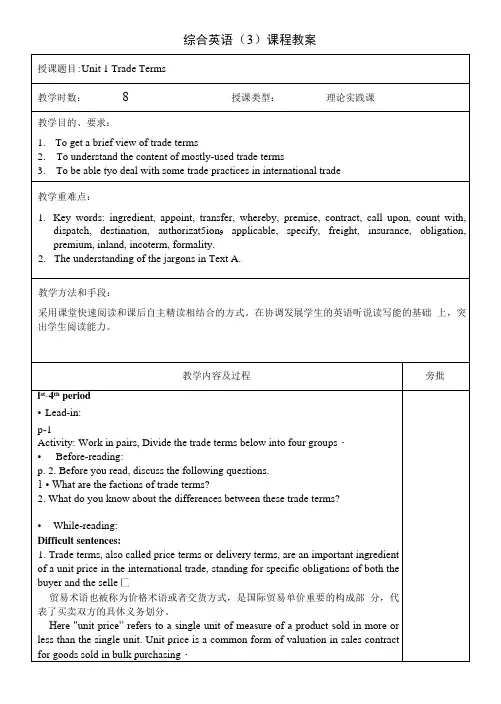
综合英语(3)课程教案8th period*Free talkingDiscussion topics: What are the differences between domestic trade and international trade? 作业布置:.1. Do Translation on p ・ 6 parts as HW.2.Try to retell the main idea of the text.3.Review the expressions about how to ask for an appointment. 课后小结:综合英语(3)课程教案综合英语(3)课程教案课后小结:综合英语(3)课程教案综合英语(3)课程教案综合英语(3)课程教案Difficult sentences:1.Foreign exchange traders generate profits, or losses, by speculating whether a currency will raise or fall in value in comparison to another currency.外汇贸易商们通过预测一种货币对另一种货币的升值或贬值进行投机,并由此盈利或亏损。
This sentence can be paraphrased as "Foreign exchange traders earn profit or loss money by doing their business with anticipation of one currency^ change in value compared with another's:Speculate, to buy goods, property, shares, etc, hoping that you will make a profit when you sell them.2.The value of a currency, in the simplest explanation, is a reflection of the condition of that contrry's economy with respect to other major economices.。
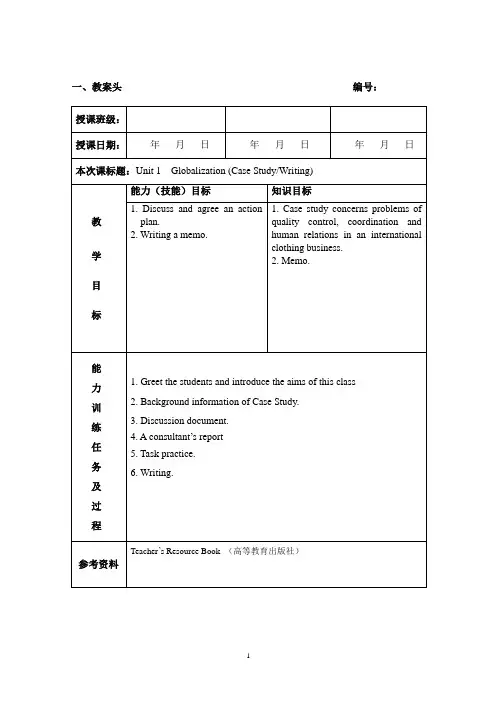
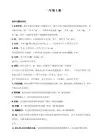
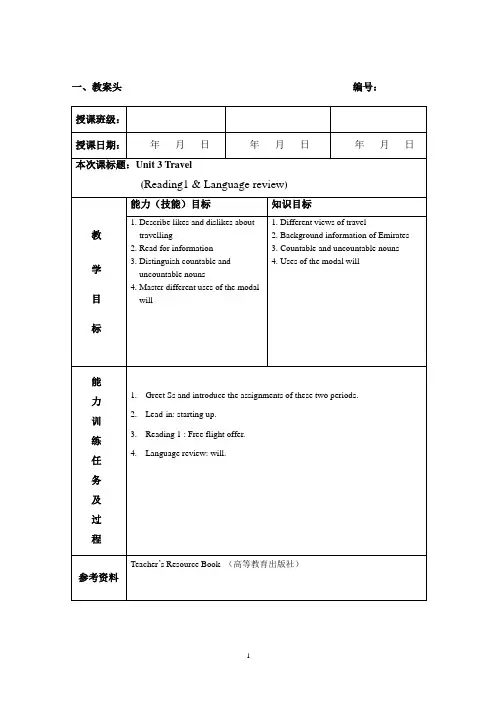
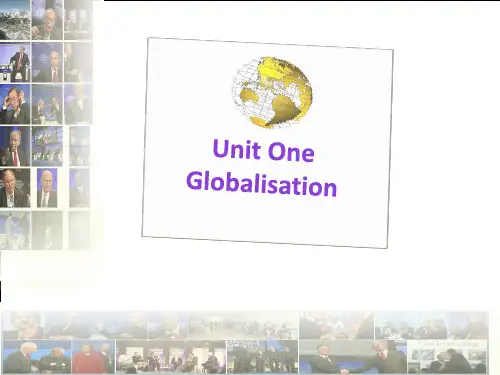
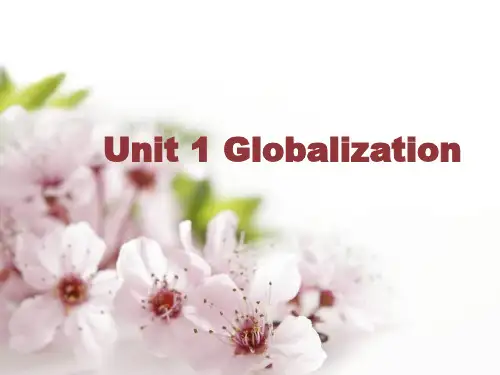
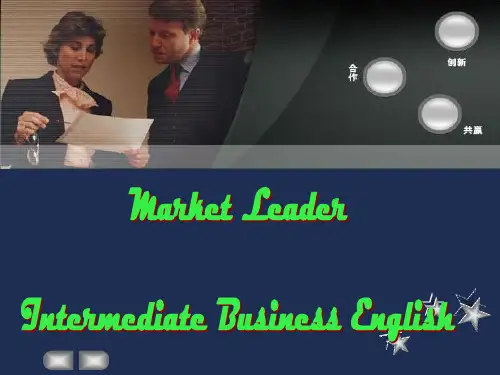
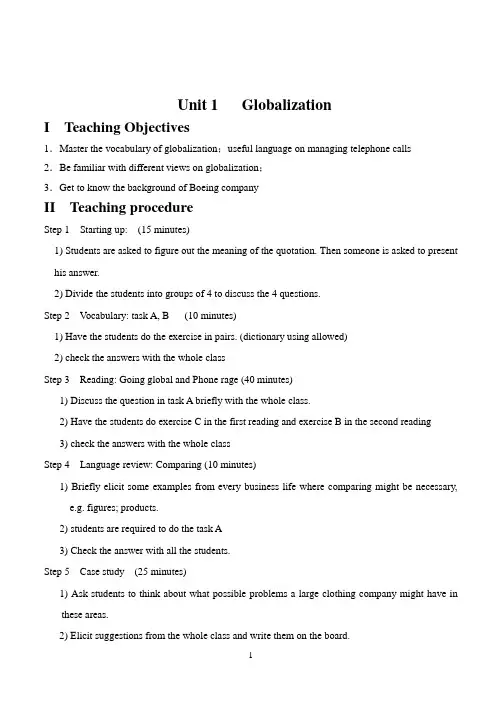
Unit 1 GlobalizationI Teaching Objectives1.Master the vocabulary of globalization;useful language on managing telephone calls2.Be familiar with different views on globalization;3.Get to know the background of Boeing companyII Teaching procedureStep 1 Starting up: (15 minutes)1) Students are asked to figure out the meaning of the quotation. Then someone is asked to present his answer.2) Divide the students into groups of 4 to discuss the 4 questions.Step 2 V ocabulary: task A, B (10 minutes)1) Have the students do the exercise in pairs. (dictionary using allowed)2) check the answers with the whole classStep 3 Reading: Going global and Phone rage (40 minutes)1) Discuss the question in task A briefly with the whole class.2) Have the students do exercise C in the first reading and exercise B in the second reading3) check the answers with the whole classStep 4 Language review: Comparing (10 minutes)1) Briefly elicit some examples from every business life where comparing might be necessary,e.g. figures; products.2) students are required to do the task A3) Check the answer with all the students.Step 5 Case study (25 minutes)1) Ask students to think about what possible problems a large clothing company might have inthese areas.2) Elicit suggestions from the whole class and write them on the board.Unit 2 BrandsI Teaching Objectives1.Master the vocabulary of talking about brands;useful language in taking part in meetings 2.Be familiar with past simple and simple perfect3.Get to know some famous brandsII Teaching procedureStep 1 Check on the answers of last-week assignments (10 minutes)Step 2 Starting up:1) Ask students, working individually, to make a list of their five favorite brand.2) Ask students to discuss the advantages of branded goods for the manufacturer and the consumer(5 minutes)3) Do exercise CStep 3 V ocabulary (20 minutes)1) Students are given 15 to finish the exercises of task A &B2) Ask few students to present their answers.3) Give explanations to some difficult terms.Step 4 Reading: (15 minutes)Questions for discussion: How can manufacturers protect their brands from piracy?1) Read the article and do exercise B.2) Have the students do exercise C and DStep 5 Language review: past simple and present perfect (10 minutes)1) Students are supposed to finish task AStep 6 Additional reading material—What’s that smell?Unit 3 TravelI Teaching Objectives1.Master the terms irritating travelers when flying; sills of making arrangements on the telephone 2.Be familiar with the usage of ―will‖3.Get to know the background of EmiratesII Teaching procedureStep 1 Check on the answers of last-week assignments (10 minutes)Step 2 Starting up: (10 minutes)1) give explanation to the quote2) introduction on Anne Morrow LindberghBorn: 6/22/1906Birthplace: Englewood, New JerseyDied: Passumpsic, Vermont, 2/7/2001Known in her own right as a writer, she was also co-pilot and navigator for her husband, Charles Lindbergh. The couple met when Anne’s father was ambassador to Mexico when Lindbergh came to visit and took the family on sight-seeing flights. Under her husband’s tutelage, Anne earned her p ilot’s license in 1931.3) Have the students do exercise B and CStep 3 Reading: Free flight offer1) Background of Emirates AirlineEmirates Airline: Dubai(迪拜)based Emirates Airline is one of the fastest growing airlines in the world and has received more than 300 international awards for excellence since its launch in 1985. Emirates now takes you to more than 80 destinations in Europe, the Middle East, the Far East, Africa, Asia, Australasia and North America.Let students see a video recording about Emirates Airline2) New wordsincentive n. sth that encourages a person to work harder, produce more or spend more moneyvoucher n.a printed piece of paper that can be used instead of money to pay for sth, or that allows one to pay less than the usual price3) Get students do exercise of task AStep 4 Reading: Passengers behaving badlyNew Words1.abusive a. rude, offensive and insulting2.verbal a. relating to or in the form of words3.assault n. a violent verbal or physical attack4.frustrate v. cause (someone) to feel dissatisfied or unfulfilled5.storm v. move angrily or forcefully in a specified directionpel v. force or oblige to do something7.adrenaline n. 肾上腺素8.cramped a. uncomfortably small or crowded9.let rip: to speak or behave violently or emotionally or without restraint10.septuagenarian n. a person who is between 70 and 79 years old11.down to: be attributable to (a factor); be the responsibility of1) Skim and scan the article to find two examples of passengers behaving badly1.A business shot out the front tyres of a plane on the runway.2. A 70-year-old hit a steward because there was no more steak.2) Check the answersUnit 4 AdvertisingI Teaching Objectives1. To enable Ss to know about advertisements, to know what factors a successful ad contains2. To familiarize Ss with vocabulary concerning advertising media and methods3. Get to know outdoor advertisementsII Teaching procedureStep 1 Check on the answers of last-week assignments (15 minutes)Step 2 Quotation: Advertising is the greatest art form of the twentieth century.‖Marshall McLuhan (马歇尔·麦克卢汉) (1911—1980), Canadian author, educator, & philosopher : Canadian academic and commentator on communications technology, who developed theories about the role of the electronic media in mass popular culture. He is best-known for the studies institutionalized as the University of Toronto’s Center for Culture and Technology, where he was direct or from 1963. McLuhan’s works include UNDERSTANDING MEDIA (1964) and MEDIUM IS THE MESSAGE(1967), in which he argued that the form of media has more significant effect on society and knowledge than the contents carried. McLuhan prophesied(预言)that printed books would become obsolete, killed off by television and other electronic information technology.Step 3 Definitions of Advertising•Advertising is promoting a product, service, brand or store.•Advertising is a paid form of communicating a message by the use of various media. It is persuasive, informative, and designed to influence purchasing behavior or thought patterns.•Advertising is defined in Webster’s dictionary ―as the action of calling something to the attention of the public especially by paid announcements, to call public attention byemphasizing desirable qualities so as to arouse a desire to buy or patronize: promote.‖Step 4 Types of Advertising•Informational advertising- describes a product’s objective characteristics—price, features, uses, etc.•Persuasive advertising - designed to shift consumers’ tastes –―Drink this beer and women will find you irresistible.‖ ― Drive this red sports car and men will love you.‖Step 5 Methods of advertisingTo reach the consumer, advertisers employ a wide variety of media. The most popular media, as measured by the amount of ad spending, are television, newspapers, direct mail, radio, Yellow Pages, magazines, the Internet, outdoor advertising, and a variety of other media, including transit ads, novelties, and point-of-purchase displays. Generally, newspapers are the most popular advertising medium, followed by television, magazines, radio, and outdoor advertising.Step 6 Discussion on the four adsStep 7 V ocabulary : Exercise BStep 8 ReadingExercise A, C and DUnit 5 EmploymentI Teaching Objectives1. Master the words or expressions related to employment2. Be familiar with past simple and past continuous3. Get to know ways to encourage new ideaII Teaching procedureStep 1 Check on the answers of last-week assignments (10 minutes)Step 2 Starting up: (5 minutes)1)―It is all one to me if a man from Sing Sing or Harvard. We hire a man, not his history.‖Henry Ford(1863—1947), American car manufacturer, was the American founder of the Ford Motor Company and father of modern assembly lines used in mass production. His introduction of the Model T automobile revolutionized transportation and American industry. He was a prolific inventor and was awarded 161 U.S. patents. As owner of the Ford Company he became one of the richest and best-known people in the world. He is credited with ―Fordism‖, that is, the mass production of large numbers of inexpensive automobiles using the assembly line, coupled with high wages for his workers. Ford had a global vision, with consumerism as the key to peace. Ford left most of his vast wealth to the Ford Foundation but arranged for his family to control the company permanently.2)Which factors do you think are important for getting a job? Choose the five most importantand give your reasons.age sex appearance astrological sign blood group referencescontacts and connections experience family background handwriting hobbies intelligence marital status personality qualifications sickness record3)Think about jobs you've had or you want to have and interviews you've attended. Ask eachother about your worst:Step 3 Reading: Choose the right candidate(20 minutes)1) Task B: Do people change during their working lives?‖Fundamentally, people stay the same. They may learn things, and later in life forget them, but basic abilities—such as language learning and numeracy—change little.2 ) Task C: What types of failures do companies experience, according to the article?People who panic; people with impressive qualifications who can't learn; hypochondriacs;unstable people; those who don't come up to expectations.3) What does a fine future behind them mean?That some people had potential when they were employed—but never realised that potential.4) Task DWord studyquick-tempered [ kwik 'tempəd ] a.性急的, 易怒的punctual ['pʌŋktjuəl] a.严守时刻的,准时的,正点的-- A punctual person always finishes everything ahead of time一个守时的人总是把事情提前做好。
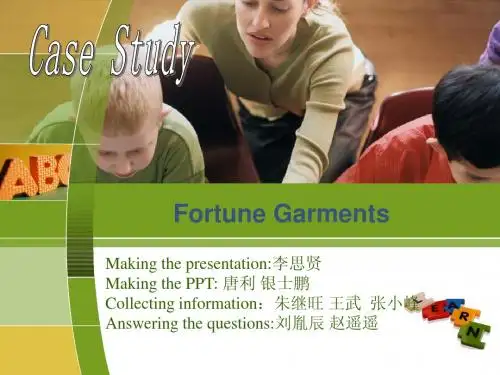
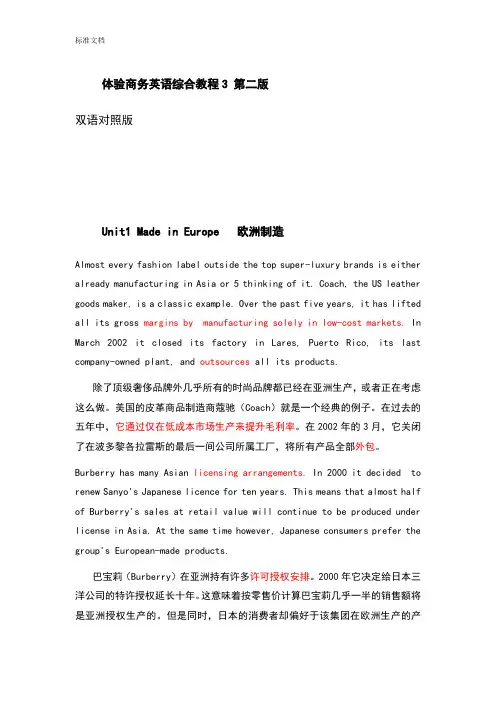
体验商务英语综合教程3 第二版双语对照版Unit1 Made in Europe 欧洲制造Almost every fashion label outside the top super-luxury brands is either already manufacturing in Asia or 5 thinking of it. Coach, the US leather goods maker, is a classic example. Over the past five years, it has lifted all its gross margins by manufacturing solely in low-cost markets. In March 2002 it closed its factory in Lares, Puerto Rico, its last company-owned plant, and outsources all its products.除了顶级奢侈品牌外几乎所有的时尚品牌都已经在亚洲生产,或者正在考虑这么做。
美国的皮革商品制造商蔻驰(Coach)就是一个经典的例子。
在过去的五年中,它通过仅在低成本市场生产来提升毛利率。
在2002年的3月,它关闭了在波多黎各拉雷斯的最后一间公司所属工厂,将所有产品全部外包。
Burberry has many Asian licensing arrangements. In 2000 it decided to renew Sanyo's Japanese licence for ten years. This means that almost half of Burberry's sales at retail value will continue to be produced under license in Asia. At the same time however, Japanese consumers prefer the group's European-made products.巴宝莉(Burberry)在亚洲持有许多许可授权安排。
第一单元欧洲制造除顶级奢侈品牌外几乎所有的时尚品牌都或者已经在亚洲生产,或者正在考虑这样做。
美国皮具制造商蔻驰(Coach)是一个典型的例子。
在过去的五年中,它通过完全在低成本市场生产已经提高了毛利率。
2002年3月它关闭了在波多黎各拉雷斯的工厂(公司拥有的最后一家工厂),将所有产品全部外包。
巴宝莉(Burberry)在亚洲有许多特许授权安排,2000年它决定给日本三洋公司的特许授权延长十年.这意味着按零售价计算巴宝莉几乎一半的销售额将是亚洲授权生产的。
但是同时,日本的顾客却偏爱该集团欧洲生产的产品。
为了应对这种对巴宝莉在亚洲工厂所生产产品的需求,三洋公司在东京银座开设旗舰店,出售从欧洲进口的巴宝莉产品.在《金融时报》的采访中,许多企业高管表示,消费者认为顶级的奢侈品牌来自欧洲,在亚洲尤为如此。
古琦(Gucci)的多米尼克·德索尔说:“无论如何,亚洲的消费者只相信:奢侈品来自欧洲,而且一定是那里制造的最好。
" 古琦的控股公司(Pinault Printemps Redoute)的首席执行官塞格·温伯格说,公司不会将古琦的生产线移到海外.然而一些业内人士认识到,就算对豪华奢侈品牌而言,这种变化也将来临。
普拉达(Prada)的首席执行官帕特里齐奥·埃特里说:“‘意大利制造’的标签很重要,但我们真正提供的是一种风格,风格是文化的表现"。
因此,他认识到高品质的时尚产品并非总是要在意大利生产.欧洲工商管理学院市场营销系的Amitava Chattopadhyay教授说:“品牌就是消费者心中的一系列联想,其中之一就是原产地.对于奢侈品,品牌的作用至关重要。
破坏它是一种弥天大罪。
没有哪个品牌经理愿意将产地和品牌形象之间的关系搞错.”第三单元活儿脏,点子棒SOL清洁公司是欧洲北部最令人向往的公司之一,走进它的总部SOL城,你会感觉就像走进了一个商业广场。
它坐落在赫尔辛基市中心一家翻新过的电影制片厂里,里面色彩炫烂、气氛喧闹,彰显着非凡的创造力。